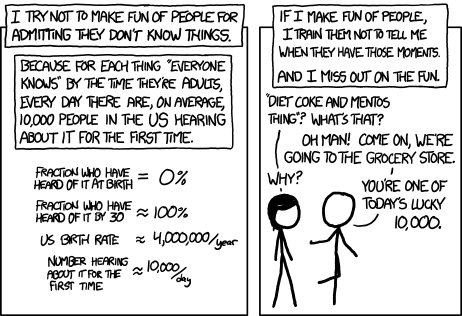At some point between birth and adulthood (whenever that happens), it becomes unacceptable to ask, "why?". Maybe this is because, as children, we thought that adults had all the answers, and when we grow up, we think we should know it all. Asking questions, admitting what we don't know, makes us vulnerable. We worry that we might be ridiculed, or that people we respect will think we are foolish or uniformed.
But, is it really, "better to remain silent and be thought a fool, than open your mouth and remove all doubt"?
I don't think it is. In science, especially, it is foolish to make assumptions (that might be wrong) than to take the time to ask, or investigate. But even with our science on the line, we contribute to the atmosphere of embarrassment, both within science, and to the general public. We forget that we should be showing, teaching, and sharing, instead of showing up others with all that we know. This can be subtle and unintentional. For example, telling a colleague, "XX found [insert specific descriptive statement] regarding this topic", versus, "I'm sure your familiar with the work of XX on this topic". Or making fun of someone for misspeaking, or a typo. Or, scoffing at someone when they don't know something that you consider to be something "everyone should know", instead of taking the time to share the information with them.
I think the xkcd.com cartoon today captures this exactly.
The mouse-over of the cartoon sums it up:
"Saying, 'what kind of idiot doesn't know about the Yellowstone supervolcano' is so much more boring than telling someone about the Yellowstone supervolcano for the first time."Let's do more showing, and less showing up.

No comments:
Post a Comment